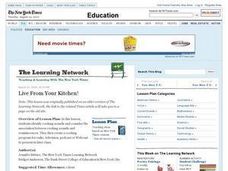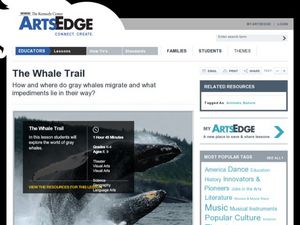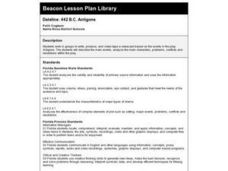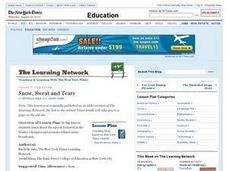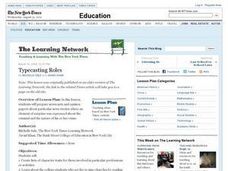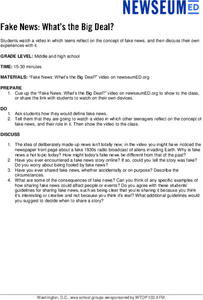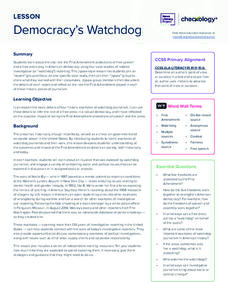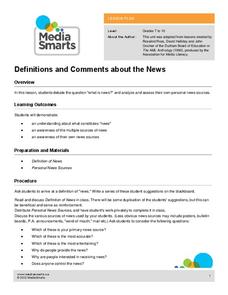Curated OER
World War II
Sixth graders read Under the Blood Red Sun (UBRS), V is for Victory (V), and Number the Stars(NS). They examine WWII through the eyes of Japanese, Danish, and American students and complete at least two projects: a radio broadcast and a...
National First Ladies' Library
Digging up the Past: Sir Arthur Evans and the Palace at Knossos
Middle schoolers explore the excavations of the Palace of Knossos on the Island of Crete. They create a simulated news broadcasting on the work of Sir Arthur Evans and his colleges. In their news investigation, learners cover such topics...
Curated OER
Live From Your Kitchen!
Students identify cooking sounds and share opinions about their associations. After reading an article, they discover the growth of radio cooking shows. They prepare an outline and script for a cooking program and present their...
Curated OER
The Whale Trail
Students research the Gray Whale. In this Gray Whale lesson, students use KWL charts to organize information. Students do Internet research to gain information about the whales. Students get into groups and create a mock news broadcast...
Curated OER
Media Arts: Creating Great Audio for Video
Students learn the basic concepts necessary to produce broadcast quality audio recordings of human speech, which can then be used in professional radio or television productions.
Curated OER
How Media Shapes Perception
Students explain the impact that the media may have in shaping their intellectual and emotional responses to current events. They examine broadcast and Web-based news sites to find subtexts through the use of language, audio, and visual...
Curated OER
Dateline: 442 BC Antigone
Students create and videotape a newscast about the events that take place in the play, Antigone. They perform scenes describing the main events, the main characters and their conflicts.
Curated OER
Snow, Sweat and Tears
Learners, in pairs, explore the sports featured at the Winter Olympics and prepare related news broadcasts.
Curated OER
Typecasting Roles
Young scholars read and discuss various news articles where an element of surprise was present about the criminal and the crime. They research a news story, present the information in the form of a newscast, and write an opinion piece.
Curated OER
Our Savage Planet in the News
Students research volcanoes, storms, atmospheric conditions and extreme environments. They collect information and create a simulation of a science newscast. They watch a video and write a letter as an eyewitness to an avalanche.
Curated OER
Student Leadership Activity
Learners rotate in groups of three to broadcast the morning news/announcements over the school pa system. They meet with the principal once a month to find volunteer opportunities. They also are responsible for organizing sports teams...
Curated OER
Current Events
Students research current events and simulate a newscast of a current news story. They watch the evening news and write a summary of a story of interest, conduct Internet research and complete a worksheet on a current event, and...
Curated OER
Cloud in the Classroom
Students describe the relationship between animals and humans. In this biology lesson, students research about the history of horses in America. They present a mock news broadcast about their research.
Curated OER
Power and Impact of Radio as a Broadcast Medium
Learners compare radio coverage of news events with coverage of 21st century new stories. They analyze various forms of media as they relate to news coverage. They write an essay comparing the impact of radio versus that of television
Newseum
Media Ethics: Fairness Formula Starts With Accuracy
As part of a study of media ethics, young journalists apply a fairness formula to news reports. They look at accuracy, balance, completeness, detachment, and ethics to determine if the reporting is fair.
Newseum
The Fundamentals of News
A short video introduces middle schoolers to different media-related news terms. Viewers then complete a worksheet and discuss the differences between news and journalism, between facts and opinions.
Newseum
Fake News — What's the Big Deal?
In a time of fake news and alternative facts, young people must have the ability to identify it and its role. Scholars watch a video of teens reflecting on the concept of fake news and the impact of sharing fake news stories. They then...
News Literacy Project
Democracy’s Watchdog
As part of a study of the importance of the First Amendment, expert groups research different historic case studies of investigative reporting, and then the experts share their findings with jigsaw groups. The case studies include Nellie...
Newseum
'The Press and the Civil Rights Movement' Video Lesson
Scholars watch a video featuring journalists who covered the civil rights movement, then respond to questions on a viewing guide. The video features interviews with participants and original news footage from the 1950s and 1960s. In...
Newseum
Bias Through History: Analyzing Historical Sources
Young journalists use the E.S.C.A.P.E. (evidence, source, context, audience, purpose, and execution) strategy to evaluate historical and contemporary examples of bias in the news. The class then uses the provided discussion questions to...
Newseum
The Press and the Presidency: Friend or Foe? How the President Is Portrayed
In theory, news reports should be fair and unbiased. Young journalists test this theory by selecting a current news story covered by various media outlets about the President of the United States. They then locate and analyze five...
Media Smarts
Bias
See how bias operates firsthand. Half of the class reads one article while the other half reads another article on the same event. The obvious differences emerge when the two sides talk about their observations though. Several handouts...
Media Smarts
Definitions and Comments about the News
Enable your class to construct a definition of the word "news" and compare it those provided from other sources. The activity, worksheet, and discussion that ensues would make a strong introduction to any media study you undertake.
Media Smarts
The Citizen Reporter
Ripped from the headlines! Discuss topical social issues like racism, discrimination, and diversity while exploring the concept of citizen journalism. Begin with a professional-looking presentation on the history of citizen journalism....
Other popular searches
- Public Broadcasting Service
- Television Broadcasting
- Broadcasting Activities
- Broadcasting Codes
- Radio Broadcasting
- Broadcasting Images
- History of News Broadcasting
- Weather Broadcasting
- Broadcasting News
- Broadcasting and Journalism
- Broadcasting (Journalism)
- Broadcasting Lessons




